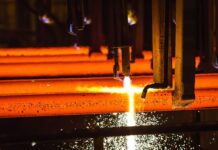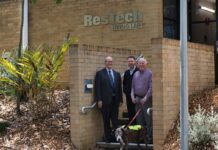Media Release by Deakin University
The nation’s largest recycling and clean energy advanced manufacturing ecosystem at Deakin University will play a crucial role in rebooting the manufacturing sector as the Government locks in Australia’s higher 2030 emissions reduction target.
Through REACH –– the Recycling and Renewable Energy Commercialisation Hub –– Deakin is working with industry, government and education partners to establish a multi-billion-dollar bioeconomy, creating scalable pathways for renewable energy and recycled materials and technologies from the laboratory to commercialisation.
Backed by a $50 million Australian Government Trailblazer Universities Program grant, with support from industry and university partners pushing the total value to $380 million, REACH will facilitate greener supply chains and accelerate business success as international markets move from a throughput economy to a circular economy.
The initiative capitalises on Deakin’s strengths in battery technology, carbon fibre, hydrogen, recycling and biomanufacturing –– as well as those of Australia’s national science agency CSIRO, industry, university and TAFE partners.
It will drive innovation and job creation in Victoria, with projections of more than $1.4 billion in revenue and 2,500 jobs in the next decade.
Prime Minister Anthony Albanese has formalised Australia’s pledge to reduce greenhouse gas emissions by 43 per cent below 2005 levels by 2030, putting the nation on course to transition to net zero by 2050. He will seek to legislate these intentions when Parliament resumes this month, which would provide the certainty that industry needs to make the switch.
Alfred Deakin Professor Julie Owens, Deakin’s Deputy Vice-Chancellor Research, said the impending changes created an even stronger incentive for industry to invest in research and technologies to reduce landfill waste and reliance on fossil fuels.
The Government has vowed to support renewables manufacturing, low emissions technologies, clean energy industries and hydrogen refuelling infrastructure. Australian independent public policy think tanks have advocated a shift to renewables to slash manufacturing sector energy costs and propel economic growth.
“Drawing on Deakin’s national leadership in research commercialisation and collaboration, REACH will fast-track ideas into smart, sustainable solutions to build Australia’s sovereign capability across key manufacturing priorities,” Professor Owens said.
“It will bolster onshore research, development and production opportunities to ensure the sector is more globally competitive.”
Initial REACH supported research-industry partnership projects include:
• establishing an Australian supply chain for the manufacture of advanced technology batteries with greater energy density and shorter charge times;
• building local capability to store and use hydrogen across a broad technology base; and
• converting organic and inorganic waste into higher-value products, including a major project to recycle soft plastic in a closed-loop system.
REACH will engage researchers from CSIRO, Federation University, RMIT University, Swinburne University of Technology and the University of Southern Queensland, alongside education and training partners The Gordon Institute of TAFE, Bendigo Kangan Institute, South West TAFE, Holmesglen Institute of TAFE, Wodonga TAFE and Swinburne TAFE.
The program will leverage huge market opportunities for recycling and clean energy technologies through partnerships with progressive industry partners including Li-S Energy, Scale FacilitationTM, BNNT Technology Limited, Calix Limited, Oztron Energy, Sydney Seaplanes, Gen 2 Carbon, HB11 Energy, Clean Energy Resources Australia, White Graphene, Quickstep, Viva Energy
Australia, JET Technology Corporation, HeiQ, Pro-Pac Packaging, Active Research, Sustainable Energy Equities Holdings Limited, Cyto-Matrix and Xefco.
More than 40 per cent of the companies involved are small and medium enterprises.
Deakin welcomes inquiries from other potential partners as it moves to formalise REACH contracts in the coming months. Please contact Deakin Research Innovations Executive Director Ross Mahon by emailing reach@deakin.edu.au or visit www.deakin.edu.au/reach for more information.
Image Supplied: www.deakin.edu.au



















